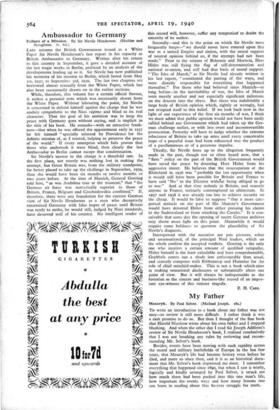Ambassador to Germany
Failure of a Mission. By Sir Nevile Henderson. (Hodder and Stoughton. 75. 6d.)
LAST autumn the British Government issued as a White Paper Sir Nevile Henderson's last report in his capacity as British Ambassador to Germany. Written after his return to this country in September, it gave a detailed account of the last tragic weeks in Berlin, prefaced by an analysis of the developments leading up to it. Sir Nevile has now published his memoirs of his mission to Berlin, which lasted from May 1st, 1937, to September 3rd, 1939. The last two chapters are borrowed almost textually from the White Paper, which has also been occasionally drawn on in the earlier sections.
While, therefore, this volume has a certain official flavour, it strikes a personal note which was necessarily absent from the White Paper. Without labouring the point, Sir Nevile is concerned to defend himself against the charge that he was unduly sympathetic to the Nazi regime and blind to its real character. That the goal of his ambition was to keep the peace with Germany goes without saying, and is implicit in the title of his book. He remarks—with an attractive frank- ness—that when he was offered the appointment early in 1937 he felt himself " specially selected by Providence for the definite mission of, as I trusted, helping to preserve the peace of the world." If every enterprise which fails proves that those who undertook it were blind, then clearly the last Ambassador to Berlin cannot escape that condemnation.
Sir Nevile's answer to the charge is a threefold one. In the first place, not merely was nothing lost in making the attempt, but Great Britain was, from the military standpoint, far better placed to take up the challenge in September, 1939, than she would have been six months or twelve months or two years before. At the time of Munich, General Goering told him, " as was doubtless true at the moment," that " the German air force was numerically superior to those of Britain, France, Belgium and Czechoslovakia combined." If, therefore, there were any foundation for the current German view of Sir Nevile Henderson as a man who deceptively entertained Germany with false hopes of peace until Britain was ready to strike, he would still, judged by Nazi standards, have deserved well of his country. No intelligent reader of this record will, however, suffer any temptatiott to doubt the sincerity of its author.
Secondly—and this is the point on which Sir Nevile most
frequently harps—" we should never have entered upon this war as a united Empire and &don, with the moral support of neutral opinion behind us, if the attempt had not been made." Prior to the seizure of Bohemia and Moravia, Herr Hitler was still flying the flag of self-determination and national re-union, and still had that basis of moral support. " The Ides of March," as Sir Nevile had already written in his last report, " constituted the parting of the ways, and were directly responsible for everything that happened thereafter." For those who had believed since .Munich—or
long before—in the inevitability of 'war, the Ides of March were merely another and not especially significant milestone on the descent into the abyss. But there was indubitably a large body of British opinion which, rightly or wrongly, had not resigned itself to this belief. If we look back now in the light of our experience of the first six months of war, I think we must admit that public opinion would not have been easily rallied behind any Government which had taken up the Ger- man challenge earlier, or with less overt and incontrovertible provocation. Posterity will have to judge whether the extreme reluctance of Britain to take up arms until every conceivable hope of a peaceful issue had been exhausted was the product of a pusillanimous or of a generous impulse.
Thirdly, Sir Nevile faces up to the allegation frequently made in the past, though not so often heard now, that a " firm " policy on the part of the British Government would have saved the peace by deterring Herr Hitler from his aggressive intent. He believes that the reoccupation of the Rhineland in 1936 was " probably the last opportunity when it would still have been possible for Britain and France to have said ' No ' to the Dictator withjut being obliged to go to war." And at that time nobody in Britain, and scarcely anyone in France, seriously contemplated an ultimatum. In 1937 and 1938 it was already too late to achieve security on the cheap. It would be false to suppose "that a more cate- gorical attitude on the part of His Majesty's Government would have deterred Hitler from either pressing his claims to the Sudetenland or from attacking the Czechs." It is con- ceivable that some day the opening of secret German archives may throw more light on this point. Meanwhile it would require some boldness to question the plausibility of Sir Nevile's diagnosis.
Interspersed with the narrative are pen pictures, sober and unsensational, of the principal Nazi leaders, which on the whole confirm the accepted verdicts. Goering is the only one who inspires a certain amount of qualified sympathy, Hitler himself is the least calculable and least comprehensible, Goebbels comes out a shade less unfavourably than usual, and scarcely competes with Ribbentrop and Himmler for the role of chief mischjef-maker. This is not a book which aims at making sensational disclosures or substantially alters our point of view. But it will always be indispensable to the historian as the sincere and business-like record of an impor- tant eye-witness of this sinister tragedy.
E. H. CARR.










































 Previous page
Previous page